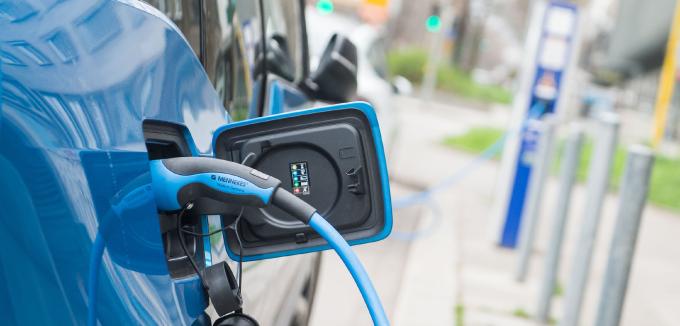DPA
An electric car charges in Stuttgart: Nearby, the Daimler Group wants to build a factory for battery cell production
Hardly any alternative to the internal combustion engine is as widely developed and widespread as the electric car. But Daimler’s works council chief at the parent plant in Stuttgart sees the single-track orientation in Germany critical.
The works council chief at Daimler’s headquarters in Stuttgart-Untertürkheim warns against the one-sided focus on electric mobility. “The battery is incredibly important to us, but you can not rely on just one pillar,” said Michael Häberle of the German Press Agency. “I do not know if we can afford to force only the mainstream battery, and then we might get hung up on the hydrogen issue.”
Daimler Show stock market chart is currently building battery factories worldwide for more than a billion euros to supply its future electric cars. Although the manufacturer no longer manufactures battery cells, it buys them from external suppliers. The batteries for the electric cars But the car maker wants to continue to produce itself in the future. In Untertürkheim, the foundation stone for such battery production will be laid on Friday. In total, eight new battery productions are to be created worldwide – in addition to the existing factory in Kamenz, Saxony.
Focus on e-car: VW, BMW and Daimler disagree in the strategy
To the strategy for the conversion on new drive types it had last dispute between BMW Show stock market chart and Volkswagen Show stock market chart given. VW CEO Herbert Diess campaigned to focus on the battery-powered electric cars. BMW boss Harald Krüger wanted to remain open to other technologies. The two and Daimler CEO Dieter Zetsche then agreed on the line that battery electric cars and hybrids “bid of the hour” were.
This was recently met with Federal Finance Minister Olaf Scholz, who then campaigned for a ten-year extended purchase premium for electric cars. Even now, the available funding for electric cars are not nearly exploited.
Daimler has also been researching hydrogen technology since the 1980s. “At Untertürkheim we are working on the fuel cell and developing it for mass production,” said Häberle. Several small series were equipped with the drive. Last year, an off-road vehicle with electric motor came on the market, which is powered by electricity from the socket and from the fuel cell.
Daimler has been researching alternatives for a long time
“I do not understand that politics does not ensure that framework conditions and also the architecture in Germany are present in order to make hydrogen attractive,” says Häberle. As it goes, for example, the expansion of the gas station network. “As long as the numbers are so low, that will never be a technology that the broad masses can afford.”
New technologies are particularly important for the Untertürkheim location. At the Daimler headquarters, internal combustion engines are manufactured for numerous other plants, including those in the USA and South Africa. If the number of electric cars increases and thus that of the required internal combustion engines decreases, tasks inevitably fall away.
DPA
Everything on electric? Daimler CEO Dieter Zetsche with Chancellor Angela Merkel in 2008 at a joint event with the energy company RWE
The works council therefore wants to negotiate that the electronic powertrain will be manufactured there in the future. “When it comes to self-production of the electronic powertrain, we are at the beginning of the talks,” says Häberle. The construction of battery production in Untertürkheim in 2017 was preceded by a week-long dispute in which works councils did not approve overtime over the weekend and thus paralyzed production.
“Do colleagues have to take to the new world?”
“What should not happen is that we talk about transformation and have no real transformation, we have to take the people from the old world into the new world,” says Häberle. “We have to rely heavily on our own training.”
Although Daimler has excluded operational layoffs for the permanent workforce for years, works council leader Häberle therefore urges a calm hand: “What happens in a hauruck action, is the same as in Fukushima with the energy industry,” says Häberle. “Without Fukushima, Germany would not have left nuclear power so quickly, and without VW and the diesel scandal, the auto industry would not be driven to implement electromobility, which may not be economically sound and, in addition, a holistic approach to life cycle assessment neglected.”
rei / dpa


